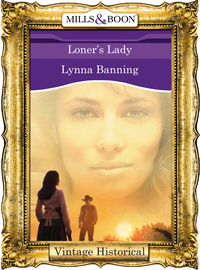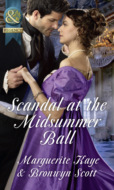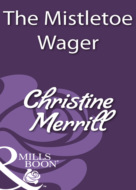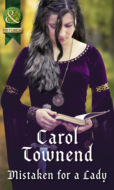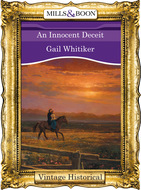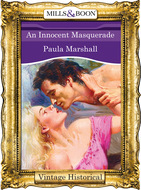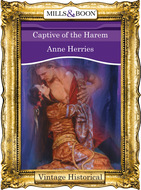Buch lesen: "Loner's Lady"
“Dan will be coming home,” Ellen said in a suddenly quivery voice.
“Most likely.” Jess didn’t say anything else for a long while.
Ellen struggled to absorb the words. How quickly her life had turned upside down. An hour ago…
Her cheeks grew hot. An hour ago she hadn’t been thinking about Dan at all. She’d been thinking about Jess Flint.
“Ellen. There’s…” he closed his eyes momentarily “…there’s more.”
Incredulous, she stared at him. “More? What ‘more’?” She punched her balled-up fist into his chest.
He caught her hand, imprisoned it in his, and when she tried to jerk out of his grasp, he lifted his arms and pinned her against him. “Ellen. Ellen.”
She went perfectly still. “All right, tell me the rest, damn you. Get it over with.”
Praise for
Lynna Banning
“Do not read Lynna Banning expecting some trite, clichéd western romance. This author breathes fresh air into the West.”
—Romantic Reviews Today
The Scout
“Though a romance through and through, The Scout is also a story with powerful undertones of sacrifice and longing.”
—Romantic Times BOOKclub
The Angel of Devil’s Camp
“This sweet charmer of an Americana romance has just the right amount of humor, poignancy and a cast of quirky characters.”
—Romantic Times BOOKclub
The Ranger and the Redhead
“…fast-paced, adventure-filled story…”
—Romantic Times BOOKclub
Loner’s Lady
Lynna Banning

MILLS & BOON
Before you start reading, why not sign up?
Thank you for downloading this Mills & Boon book. If you want to hear about exclusive discounts, special offers and competitions, sign up to our email newsletter today!
Or simply visit
Mills & Boon emails are completely free to receive and you can unsubscribe at any time via the link in any email we send you.
Contents
Chapter One
Chapter Two
Chapter Three
Chapter Four
Chapter Five
Chapter Six
Chapter Seven
Chapter Eight
Chapter Nine
Chapter Ten
Chapter Eleven
Chapter Twelve
Chapter Thirteen
Chapter Fourteen
Chapter Fifteen
Chapter Sixteen
Chapter Seventeen
Chapter Eighteen
Chapter Nineteen
Chapter Twenty
Chapter Twenty-One
Chapter Twenty-Two
Chapter Twenty-Three
Chapter Twenty-Four
Chapter Twenty-Five
Chapter Twenty-Six
Chapter Twenty-Seven
Chapter Twenty-Eight
Epilogue
Author’s Note
Chapter One
S he saw him coming up Creek Road and for a moment her heart stopped beating. Clutching the pitted garden trowel in one hand, she tucked a wayward strand of hair back under her blue sunbonnet and squinted into the late afternoon sun until her vision blurred.
But it wasn’t Dan. She released the breath she’d been holding and studied the man. A worn-looking leather saddle weighed down one shoulder, and a dark hat slanted over his eyes. He walked with a slight hesitation in his gait, as if one knee was stiff. Just another saddle tramp looking for a meal.
Ellen watched for a minute, then bent to the row of leafy vegetables and pulled up an extra half-dozen carrots for supper. She couldn’t bear the thought of someone, even a saddle tramp, going hungry.
Drawing in a slow lungful of the hot, earth-scented summer air, she resumed weeding. Probably lost his horse in a poker game. She sniffed at the thought and yanked a clump of chickweed out of the ground. What was it about gambling that men found so irresistible?
Getting something for nothing, Dan had told her once with a cocky grin. Ellen knew better. Most often he started with Something and ended up with Nothing.
Pulling the kitchen knife from her apron pocket, she sliced off a dozen yellow squash and two shiny green peppers. At least her simple meal would be colorful.
She straightened again as the man turned in at her gate. It took him a long time to push open the rickety contraption she had cobbled together out of used nails and crooked sugar pine limbs. It sagged badly, the rusted hinge held in place by a single screw. Another of the thousand and one things she hadn’t had time to fix.
“Miz O’Brian?”
Ellen stepped out of the vegetable patch toward him. “Yes? I am Mrs. O’Brian.”
Jess dropped the saddle where he stood. “My name’s Jason Flint, ma’am.” From beneath the brim of his hat he studied her face for a flicker of recognition. Nothing. Under her own floppy gingham bonnet, the woman’s blue eyes drilled into him like two steel bolts.
“Most folks call me Jess.” Again he waited for a reaction, but her sun-reddened features betrayed not a hint of feeling. Damn and then some. How lucky could he get?
She stuck out a dirt-stained hand. “Mr. Flint.” She had a strong handshake for a small woman, but quicker than he could wink she tucked her hand back into her apron pocket.
“Guess you’d like to know what I’m doing out here on your farm?”
Those blue eyes widened slightly, but she kept her face impassive. She’d make a good poker player, Jess thought. Or maybe she was just a careful farm wife who’d seen a good number of strays in her time.
“Truth is…” he began.
“You’re hungry,” she stated.
“Yes, ma’am.”
Her hands went to her hips. “And broke.”
Jess hesitated. “Well…” He’d sold his horse and most of his possessions three days ago so he could eat. Hell yes, he was broke.
“Out-of-work-down-on-your-luck-and-lost-your-horse,” she said. It wasn’t a question. She ran the words together as if she was reciting a poem.
“Yes, ma’am.” He expected her to frown or purse her lips and tsk-tsk at him, but she did neither. Instead, she gave him a long look and headed for the back porch of the farmhouse.
Jess let his gaze follow her, hoping she’d say something with the word supper in it. He noted the peeling white paint on the house and the lopsided angle of the screen door. A hole as big as his fist gaped in the mesh. He’d bet she had a kitchen full of fat black flies.
The back door wheezed open and slapped shut and her voice floated to him through the screen. “Supper’s in half an hour. Wash up at the pump.”
Jess swiped off his hat, bent over the pump and splashed cool water on his face, then smoothed a handful of water through his hair. Glancing at the back door to make sure she wasn’t watching, he stripped off his shirt and rubbed water over his chest and neck.
Using his shirt, he dried off and shrugged the damp linen back on. The wrinkled garment smelled sweaty as a lathered horse, but at the moment it was the only shirt he owned.
With time to spare before supper, Jess carted his saddle out to the barn, then made a slow circuit of the farmhouse. The weathered paint on the north side looked more gray than white, but crisp white curtains hung at the parlor windows. A single wicker rocking chair sat on the wide front porch.
When he reached the back of the house, the screen door scraped open and he heard her voice again. “Suppertime!” Jess clomped up the back steps, hoping she wouldn’t hear his stomach growling.
The first thing he smelled was fresh coffee. The second was hot biscuits, and beyond that he didn’t care. This was as close to heaven as he was going to get for a while.
She’d set two places at the battered kitchen table. Painted a fiery red, the finish looked speckled where the original green showed through. Years of hard use had dulled the finish on the white china plates; the only piece that wasn’t cracked was the cream pitcher.
She gestured for him to sit, then turned to the stove and scooped fluffy-looking biscuits into a basket. Jess used the opportunity to take a closer look at her.
Not bad. Maybe twenty-five or -six. Trim waist, nicely rounded backside. Suntanned arms, and long, long legs, judging from the length of her blue work skirt. A ribbon tied at the back of her neck kept a tumble of brown curls in check.
Her shirt—a man’s work shirt, he noticed—looked mighty incongruous under the ruffled apron.
She turned toward him. “Coffee?”
“Sure. Straight.”
Her gaze narrowed. “‘Straight’ applies to whiskey.”
“I meant no cream,” he said.
When she spun back to the stove, he glanced at her shoes. Work boots. He should have guessed. She farmed the place by herself. That would explain the dilapidated state of the barn and the henhouse, the peeling paint, the worn planks in the kitchen floor.
She sure didn’t talk much. He wondered how long she’d been without a man.
She dished up a platter of sweet corn and a bowl of carrots and squash with something green mixed in. No meat, but he wasn’t complaining. She untied her apron, hung it on a nail by the back door and set the basket of biscuits on the table.
Jess waited. After an awkward pause, she passed him the platter of corn. “What are you waiting for? I thought you’d be hungry.”
“I am hungry. Just wanted to see if you were the type that said grace.”
“Grace!” She snapped out the word like a pistol shot. “The good Lord had little enough to do with putting food on this table.”
Jess said nothing. Guess he’d hit a nerve.
Her shoulders relaxed. “I apologize, Mr. Flint. Sometimes it seems like the Lord doesn’t even notice how hard I’m working down here.”
“You run this place on your own?” He knew the answer, but he wanted to ask anyway.
“Yes.” With jerky movements she split open a biscuit and dunked half into the soggy vegetables on her plate.
“How long?”
“Two years and eight months.” The sharp edge in her tone said it all. He wondered how she felt about that two years. How much she knew.
“Husband dead?”
Ellen watched him down a gulp of water from the glass at his elbow, and laid her fork beside the plate. “I don’t know. He went off to town one day and never came back.”
“Gambling man?”
“Yes. No use varnishing the truth.”
Her guest looked up. “Mind telling me his name?”
“Daniel. Daniel Reardon O’Brian.”
An odd expression crossed the man’s sun-darkened face. “Irish, I’d guess,” he said in a quiet voice.
She nodded. “The worst part is…” She didn’t let herself finish the thought.
Mr. Flint slathered butter onto an ear of pale gold corn. “Got a hired man to help out?”
She leveled a long look at him. “I had one until four months ago. He came back from town smelling of spirits and tried to— No, I don’t have a hired man.” She leaned forward and skewered him with those eyes again. “And no, I do not want one.”
He bit into the corn and chewed in silence.
“It’s only a small farm,” she explained. “I can keep up the housework and the garden. Planting corn and potatoes and alfalfa keeps me pretty busy. And of course there’s the stock.”
“Stock?”
“My milk cow, Florence. And the chickens. And one horse.”
His eyes flicked to hers and immediately dropped to the biscuit on his plate. “What kind of horse?”
Ellen sniffed. “He’s not worth stealing, Mr. Flint. He’s a plow horse.”
“Wasn’t thinking of stealing it, ma’am. I was thinking of riding it.”
“Where on earth to?”
“Town. And back.”
Ellen regarded him with as much calm as she could muster. He had longish black hair and skin so sun-darkened he could be Indian. After a good minute she trusted herself to speak in a civil tone. “For a poker game? For loose women and liquor? For—?”
“For supplies.” He growled the words without looking at her.
“Whose supplies?” she snapped. Why were her nerves on edge around this man? She’d fed plenty of wandering cowboys; not one of them had ever riled her like this.
“Yours. How do you tote things from town?”
“I walk. And once a week Mr. Svensen drives a wagon out from the mercantile to collect my butter and eggs. He brings the flour and molasses and other heavy items.”
“You don’t have a wagon?”
“No, I don’t have a wagon. Dan took it.” Ellen pressed her mouth into an unsmiling line. He’d taken a few other things as well. Her faith in the silky-voiced Irishman with the dancing eyes. Her trust. Her hope for a child.
Again that puzzling expression came over Mr. Flint’s face. Part disbelief, part…anger? She guessed he didn’t believe her.
“Surely you don’t think I would lie about such a thing?”
“No, ma’am.”
Jess wished she had, though. He didn’t want to think about the fix husband Dan had left her in. He needed to think about how he was going to do what he’d come here for.
They ate their supper in silence except for the faint burble of coffee on the stove. All at once she seemed to hear it, and flew across the room to shove the blue speckleware pot to one side. “I’ve overboiled it again! It must taste pretty awful.”
“I’ve had worse. I’ve made worse myself.”
Ellen sighed. “I guess overboiled coffee isn’t that important. Farm life has a way of paring things down to essentials. Survival is what’s important.”
“Yes, ma’am. It surely is. Makes a person wonder just how far they’ll go with survival in mind.”
He gave her a long look. His eyes were a dark, dark blue, almost black, and the way he scrutinized her started uneasy flutters in her stomach. This man didn’t miss much. Did he see how weary she was? How her back ached and her heart was shriveling up? She knew being a good wife meant sticking it out, for better or worse, but oh, how she smarted under the load.
Still, smart she must. No respectable woman on the western frontier caved in to exhaustion or loneliness.
He gave her a lopsided smile and dropped his gaze to his coffee cup, still two-thirds full.
“Miz O’Brian, would you mind if I slept in your barn tonight?” He sent her another crooked smile. A bigger one. The corners of his dark eyes crinkled and a dimple appeared on one sun-bronzed cheek.
Ellen studied him. She’d let the odd cowboy throw down a bedroll in the hay, but not often. Being alone out here three miles from town made her cautious. Mr. Flint made her more than cautious. He asked too many questions, and more than once she’d caught him looking at her as if trying to guess how much she weighed. She felt off balance. Vulnerable.
“Miz O’Brian?”
“I am considering it.” His eyes were hungry. Calculating. They made her unsure of things she’d never questioned before. Like why she kept on struggling to keep up the farm, waiting, always waiting, for Dan to return.
Still, she had no cause to be afraid. She kept Dan’s loaded shotgun under the sink. “Very well, Mr. Flint. You may sleep in the barn.”
“Much obliged, ma’am. I’ll feed your stock before I turn in.”
“There is no need. Florence needs to be milked, and I—”
“I’ll see to it.” He took a final swallow of coffee and pushed away from the table. “Thanks for the supper.”
He ambled toward the back door, the hitch in his gait even more obvious. Even with the limp, though, she liked the way he moved, unhurried and oddly graceful for a tall man with a stiff knee.
The screen whapped shut behind him. She listened to the uneven rhythm of his boots on the porch steps, then gathered up the two dirty plates and the empty corn platter. She’d cooked a dozen ears; only two cobs rested on her plate. The other ten, chewed clean, were piled high on his plate. The man was more than just hungry; he was starving.
Before she finished drying the dishes, a full metal pail of foamy milk sat inside the back door. Beside it lay a dozen eggs wrapped in a red bandanna. He must have searched under every hen she owned to come up with that many at an evening gather.
Ellen smiled wryly. No doubt Mr. Flint was hinting at breakfast. She scrubbed the last kettle and hung the sodden towel on the rack near the stove. Well, it wouldn’t hurt to let him sleep in the barn for one night.
She poured the fresh milk into four shallow milk pans, unloaded the eggs into a bowl and set it all in the cooler off the back porch. By morning there would be more cream, enough to churn and some for scrambled eggs.
That is, if she let him to stay for breakfast. Something about Mr. Flint made her nervous. Maybe it was his eyes. They were the darkest blue she had ever seen, darker even than the morning glories she’d planted along the front fence.
She tried not to think about him as she washed out the milk pail and lifted the lantern from the counter. Halfway up the stairs to her bed, she jolted to a stop. She hadn’t even offered him a candle to light his way around the barn.
Maybe he didn’t need it. With those predatory eyes he could probably see in the dark.
A shiver crawled up her backbone as she opened the door to her bedroom. Lamplight made the blue patchwork quilt, and the puffy matching pillow covers she’d sewn, glow with inviting warmth. She moved to pull the curtains shut and caught her breath.
Was he watching her window from the barn? Quickly she blew out the lantern flame.
The sooner he was gone, the better. She didn’t want to look into eyes that hungry any longer than she had to.
Chapter Two
T he rooster woke her. With a groan Ellen planted her bare feet on the floor and forced herself upright. Peach-gold sunlight spread through the cozy room, glinting in the framed mirror on the chiffonier and washing over her needlework basket and the ticking clock on the night table. This morning the light looked soft and creamy as buttermilk.
She washed, then hastily caught her unruly curls with a strip of calico at the back of her neck. On impulse, she leaned forward to inspect her face in the mirror.
Merciful heavens, what a sight! She looked every bit as tired as she felt, even more than the last time she’d looked, which was…let’s see…Easter Sunday? Her skin was sun-browned and freckles were sprinkled across her nose. The area around her mouth looked pinched, and her eyes…
Her eyes looked weary, as if ten years of trouble had been added to her life. Worse, there was a hopeless expression in their depths she didn’t like one bit. She looked like Mama had before she died. Worn-out. Was this what he saw?
Didn’t much matter, she guessed. A woman alone as much as she was got used to the darker side of things.
While she dressed in her blue work skirt and a clean blue shirt of Dan’s, she thought about the stranger sleeping in her barn. For no reason she could name, she didn’t trust the man.
Come now, Ellen. You must not judge a person by his appearance alone. Even a man with eyes she couldn’t read and a way of moving that reminded her of a cat. A big cat, with slim hips and a quiet way of speaking. He set all her nerves on edge.
With a sniff and a quick shake of her head, she marched down the stairs to the kitchen. Nerves or no nerves, she had a farm to run.
Another half bucket of milk sat just inside the back door. Blast the man. All right, she’d fix his breakfast. But first she had to sprinkle some mash for the chickens and turn the cow into the pasture.
She took two steps into the chicken yard and halted. The hens were clucking contentedly over fresh mash already spread in the wooden feeder. Well, of all the…
Ellen headed for the barn.
Florence was not in her stall. And the horse was gone! “Tiny? Where are you, boy?”
She searched the barn, then the yard. If he’d gotten into her carrots again she would scream.
Not in the garden. Not nibbling on green apples in the orchard. Not anywhere she could see.
Damn! That man had stolen her horse!
Oh, how could he? After a summer so scorching she’d watered her vegetables with bathwater and sprinkled down the henhouse at night, losing her horse was the last straw. Why could she not have one single day without feeling as if all the sand inside her was dribbling out?
Unaccountably, she started to cry. Stinging tears slid down past her nose and dripped onto her shirt front. Let me have just one day, Lord, when nothing bad happens. When I think I can make it through this.
No wonder she had aged a decade since Easter.
An insidious question needled into her mind. Was it worth it to hold on?
The answer came almost instantly. It was worth it. This farm was the only piece of ground that had ever belonged to her, and she’d be damned if she’d give it up. She held on to it partly for Dan, but mostly for herself. She’d scratched a vegetable garden out of a patch of bare earth, planted honeysuckle to spread over the privy, roses and black-eyed Susans and…
Yes, she worked hard to make ends meet, but she loved the place. She couldn’t imagine living anywhere else.
Besides, she had nowhere else to go.
Sniffing back tears, she marched out the barn door and slammed it shut, wondered why she’d let that drifter stay.
Because you are lonely. Because she wanted to hear the sound of another person’s voice. She wrapped her arms over her belly and shut her eyes. She hurt so much she didn’t realize how furious she was until she began to tremble.
Oh, for Lord’s sake, pull yourself together.
She snapped open her eyes. Just as she took a step toward the house, something moved in the alfalfa field beyond the creek.
Florence! Thank God. At least he’d left her the cow. Brushing the tears off her face with her shirtsleeve, she gathered up her skirt in one hand and began to run toward the animal.
Her breath hitched, and when she reached the creek bank, she felt a bit dizzy. No time to remove her boots. Instead, she hiked her skirt higher and splashed into the burbling water.
The thin, sharp-faced man behind the counter sent Jess a look of disbelief. “You say Miz O’Brian sent you?”
Jess tightened his lips. “No, I didn’t. I said I’d come for her supplies. She didn’t send me.”
“Fine distinction, mister,” the mercantile owner said. “We kinda look out for the lady, see. Ever since her husband run off. No one’s ever bought supplies for her before.”
Jess shifted his weight to his good leg. “I didn’t say I was buying the goods, just delivering them.”
“With what?” Gabriel Svensen had sold sundries in Willow Flat for thirty-five years; no one had ever gulled him out of so much as a stick of peppermint candy.
“I’ve got a horse outside.”
“Yeah, I recognize Tiny all right. You ain’t never gettin’ a barrel of molasses on that snake-blooded old nag.”
Jess bit his tongue. Most times he didn’t have to ask for anything twice. But that was back when he was well known. Those days were long gone. “Don’t want molasses. What I—Miz O’Brian—needs is a sack of sugar.”
“White or brown?” the proprietor snapped.
“White.”
Svensen’s gray eyebrows shot up, but he said nothing, and Jess pivoted to survey the bushel baskets of produce arranged at the front of the store. “And a dozen lemons,” he added. “And six oranges. She’s got credit here, doesn’t she?”
Svensen opened his angular jaw with a crack. “She does. You don’t. And Miss Ellen’s not one to add the fancy things onto her bill. You sure she wants white sugar? And oranges?”
Jess grinned in spite of himself. “I’m sure. She…needs them.”
“Hell, maybe she’s makin’ a batch of marmalade, or a cake, like every other woman in town. What do I know? I’ll just wrap ’em up if you’d care to look around.”
“I’ll wait. It smells good in here.”
Svensen spread a length of brown wrapping paper on the counter and went to work. “Reckon that good smell’s coming from Iona Everett’s bunches of lavender hangin’ there on the beam.” The shopkeeper tipped his chin up to the timbered roof. “And the shipment of spices and brown sugar that came in yesterday. The ladies are havin’ a big cake-baking hoo-rah on Sunday, raisin’ money for the new church.”
As he talked, he rolled up each orange in a square of paper—“special for Miss Ellen”—laid them on top of the ten-pound bag of sugar and corralled the lemons into a paper sack. Then he bundled all the items up in one neat package and tied it with grocery twine.
“Remind Miz O’Brian about the cake do, will ya? She deserves an afternoon off.”
Jess nodded. “She does.” He scooped up his package and had turned to go when he heard Svensen’s raspy voice.
“You watch your step around Miss Ellen, mister. She’s a real lady, even if she does work a farm.”
Jess nodded again and strode outside to the hitching rail where he’d left the horse. Tiny, was it? He chuckled. The only “tiny” things were the other horses tied at the rail. The huge head of the plow horse towered over all of them.
He plopped the bulky package on Tiny’s sturdy back and heaved himself up. The horse was so broad his saddle wouldn’t fit; he’d left it in the hayloft with his saddlebag, and ridden bareback. Clicking his tongue, he walked the animal down the main street and onto Creek Road.
Ellen. So her name was Ellen. He wondered how long it would take before she let him call her that. She didn’t know it yet, but he planned to stay. For as long as it took.
He reined up at the sagging front gate and slipped off the horse to wrestle it open. It needed another screw and ten minutes of his time. He’d do it after breakfast.
His stomach gurgled as he led Tiny through the gate and maneuvered the rickety thing closed. Maybe another hinge, as well. And some real wood, not these curlicue pine branches she’d used.
At the back porch steps he halted and peered through the screen door. “Miz O’Brian?”
The kitchen was empty. He scanned the garden and the spindly looking apple trees at the back fence. Where the hell was she?
He tramped into the house, checked the neat parlor, where crocheted doilies lay on the arms of the faded green velvet settee, then climbed the stairs and checked each of the four bedrooms. All empty. Maybe the barn?
By the time he’d rubbed Tiny down with an old gunnysack and given him some oats, there was still no sign of Ellen. An odd prickle swept up the back of Jess’s neck. He headed for the henhouse, but found nothing but clucking brown chickens and one lordly rooster. Maybe she was visiting a neigh—
He heard something. He shushed the chickens and listened.
A voice. Thin-sounding and some distance away, but calling out at regular intervals.
“Miz O’Brian?” Jess shouted. He took a step toward the sound. “Ellen?”
Another faint cry, and Jess headed toward the creek. What was she doing down there? “Ellen? Miz O’Brian?”
A weak cry carried to him and his breath stopped. She was hurt. A cold sweat started at his hairline. Oh, God, no. What had they done to her?
Without thinking he began to run.
Die kostenlose Leseprobe ist beendet.
